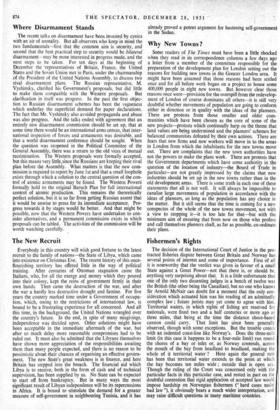The New Recruit
Everybody in this country will wish good fortune to the latest recruit to the family of nations—the State of Libya, which came into existence on Christmas Eve. The recent history of this once- flourishing territory has offered little in the way of political training. After centuries of Ottoman stagnation came the Italians, who, for all the energy and money whiCh they poured into their colony, kept the reins of government firmly in their own hands. Then came the destruction of the war, and after the war a hardly less destructive drought and famine. For five years the country marked time under a Government of occupa- tion, which, owing to the restrictions of international law, is bound to be a frustrating experience for all concerned. And all this time, in the background, the United Nations wrangled over the country's future. In the end, in spite of many misgivings, independence was decided upon. Other solutions might have been acceptable in the immediate aftermath of the war, but after so much delay more reasonable compromises had to be ruled out. It must also be admitted that the Libyans themselves have shown more appreciation of the responsibilities awaiting them than many people expected, and there is no reason to be pessimistic about their chances of organising an effective govern- ment. The new State's great weakness is in finance, and here Britain has stepped into the breach. The financial aid which Libya is to receive, both in the form of cash and of technical supervision, has been supplied by us. No State can be expected to start off from bankruptcy. But in many ways the most significant result of Libyan independence will be its repercussions in Africa. It is bound to stimulate the demand for a greater measure of self-government in neighbouring Tunisia, and it has already proved a potent argument for hastening self-government in the Sudan.






























 Previous page
Previous page